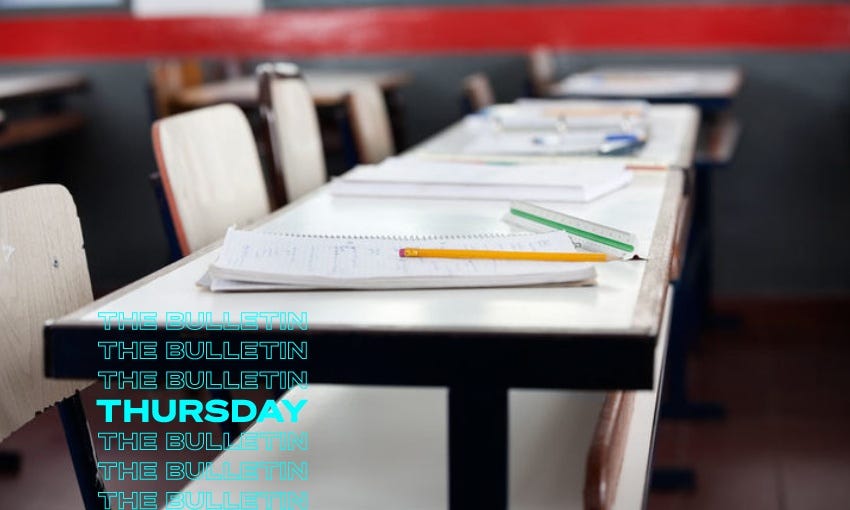All polytechs to cut costs to shrink mega polytech’s deficit
The new mega polytech is trying to reduce a forecast $110m deficit by $60m. Each institution being rolled into Te Pūkenga needs to make a 3% saving to achieve it.
Mōrena and welcome to The Bulletin for Thursday, August 4, by Anna Rawhiti-Connell. Presented in partnership with Z Energy.
In today’s edition: open letter to prime minister to act on monkeypox now; MP surprised to find bill breaches Bill of Rights; All Blacks heading into test a betting rarity; but first, the plan to reduce Te Pūkenga’s deficit.
Te Pūkenga needs to try and reduce a forecast $110m deficit to “closer to $50m”. (Image: RNZ/123 RF)
All institutions need to make a 3% saving
Once heralded as a “big win” for Hamilton, it’s safe to say the mega polytech Te Pūkenga is now, as RNZ’s Jane Patterson writes, “beset with difficulties”. Te Pūkenga chair Murray Strong and acting chief executive Peter Winder appeared in front of the education select committee yesterday where they outlined how they were going to try and reduce a forecast $110m deficit to “closer to $50m”. Also under scrutiny at the hearing was exactly what the institute would look like, how it would be staffed and how many people faced losing their jobs. The "quantum" of any job losses had not yet "been determined", said Strong.
Well-run polytechs being penalised
Each of the 16 institutions being rolled into Te Pūkenga needs to make a 3% saving. “That’s not insignificant, given that we’re halfway through the year,” said Winder. The National Party has said well-run and managed polytechs are being “punished” by the decision to make all 16 cut their budgets. It’s worth watching the video on that story link, as National’s tertiary education spokesperson Penny Simmonds tries to determine whether an acting-acting CEO will be put in place and paid, when the acting CEO Peter Winder goes away for two weeks. Simmonds is formerly the chief executive of Southern Institute of Technology (SIT). Incidentally, SIT, which is famous for its zero fees pledge, as plugged by mayor Tim Shadbolt, may look at introducing fees across several courses that are currently free as part of the merger.
CEO still on leave, on full pay
Murray Strong also confirmed at the select committee hearing that chief executive Stephen Town is still on leave, on full pay. Town's contract ends in July next year, but Strong refused to go into details around his personal leave which, as chair, he had signed off. Strong was asked whether the $13,000 a week being paid to Town while he was on leave was coming out of cuts to the head office budget. Te Pūkenga announced four days ago that they were making $8m in cuts to head office costs as part of efforts to reduce the deficit.
“Complex, confusing and unsettling” transformation noted by CEO in mid-2020
In a report for Reseller News in May, Rob O’Neill noted that there are 140 different information and communication systems being used across 24 organisations at Te Pūkenga. O’Neill also notes that Town wrote in mid-2020 that Te Pūkenga’s transformation “is going to be complex and at times confusing and unsettling”, and that his role is “to minimise confusion, maximise clarity, and make sure we take everyone with us on the journey”.
It’s time to put forward nominations for the Kiwibank New Zealander of the Year Awards
Know a local or national legend who makes you proud to be Kiwi? Nominations are now open for the 2023 Kiwibank New Zealander of the Year Awards and you can put forward the people going above and beyond to make a difference to Aotearoa in one of seven categories. This is your chance to showcase them to the country, so head to the website to cast your nomination today. (Sponsored)
Sexual health experts say we must take action on monkeypox now
The Burnett Foundation Aotearoa (formerly the AIDS Foundation), the New Zealand Sexual Health Society and the Univeristy of Auckland’s Peter Saxton say the country has a rapidly closing window to avoid serious public health consequences. They have written to the government asking it to take steps to prevent monkeypox becoming endemic. There are currently three known cases of the virus in New Zealand and the Ministry of Health says there is no evidence of community transmission, and that the risk of transmission is considered low. The response in the US, which has been described as “slow and bureaucratic”, has seen monkeypox spread rapidly across the country. The virus is disproportionately affecting men who have sex with men and a preemptive vaccination campaign for those groups has been started in New York.
Green MP Golriz Ghahraman surprised to find her bill breaches the Bill of Rights –just.
As the Herald’s Thomas Coughlan reports, Ghahraman, a former human rights lawyer, has a members’ bill intended to be a fix of New Zealand's electoral rules. Bills introduced to parliament get scrutinised for whether they breach the Bill of Rights. If they do, they are then vetted by the attorney general to check they are consistent with the Bill of Rights and whether any breaches can be justified in a "free and democratic society". David Parker's review of Ghahraman’s bill found parts were inconsistent with the Bill of Rights, but only just. Parker’s concern relates to freedom of expression but that alone wasn’t cause for a breach, and referred to an absence of information and wrote that he needs to see more. The government is currently undertaking its own legislation programme of electoral law reform.
Why support The Spinoff? Here's what one of our members had to say…
"As a New Zealander living in Sydney, The Spinoff helps me to feel in touch with what's happening back home. There's a great breadth to the content – from political stories to "best chippies" exposés – and the enthusiasm from your contributors is palpable. I feel happy and proud to be a member, and I hope The Spinoff continues to thrive and to demonstrate what can be achieved by independent media."
Ian Haigh, Sydney
Whether living here or abroad, if like Ian you value our work please show your support by becoming a member today.
Click and collect
National Adaptation Plan released yesterday
Dominion Post editor and former Washington Post Beijing correspondent Anna Fifield says we must stand up for Taiwan.
Annabelle Lee-Mather and Mihingarangi Forbes discuss their exit from Māori Television in 2013 in wake of their investigation into the Te Kōhanga Reo National Trust.
This should go without saying, but do not try to take your pet cat to a national park, even if you have dressed them for the weather.
Christopher Luxon immortalised as Humpty Dumpty in new Backbencher puppet. Christopher Luxon also sings Bills.
Got some feedback about The Bulletin, or anything in the news? Get in touch with me at thebulletin@thespinoff.co.nz.
If you liked what you read today, share The Bulletin with friends, family and colleagues.
Charlotte Muru-Lanning talks to a student teacher who fears her cohort are getting burnt out before they've even entered the workforce. Reweti Kohere looks at how supply chain shortages are affecting trans women's access to hormone replacement therapy. Chris Schulz takes a photographic journey through the construction of the Sky Tower 25 years ago. Toby Morris calls for the Commonwealth Games to include a random PE teacher in every event as a kind of human yardstick. Alex Casey finds out what it's like when your wildest dreams come true in her review of watching Love Island at the pub.
Medal update, underdog odds for All Blacks
As per the last few days, it’s been a great run overnight for the New Zealand team at the Commonwealth Games including three bronzes, a gold and two silvers. Stuff has all the updates and live action here.
As a break from Games news, here’s the historically not-so-great news for the All Blacks ahead of their test match against South Africa. For the first time in 13 years, and just the fourth time in the history of New Zealand sports betting, the All Blacks are underdogs going into a match.
The present we inhabit is shaped by the mixed legacies of the past
Today’s long read is a collection of reads that Annalisa Bolin has curated about heritage sites. Included is one from Steve Kandell titled “The Worst Day Of My Life Is Now New York's Hottest Tourist Attraction” in reference to the 9/11 memorial.
“People often think of heritage as something they’re proud of, a unifying point around which to coalesce. But heritage comprises the horrible parts of history, too, the ones many would prefer to forget, or over which societies continue to come into conflict.”











That last quote, that's interesting. I often find it's the horrible stuff that I want to dive deeper into, how did we get there, what can we do different?